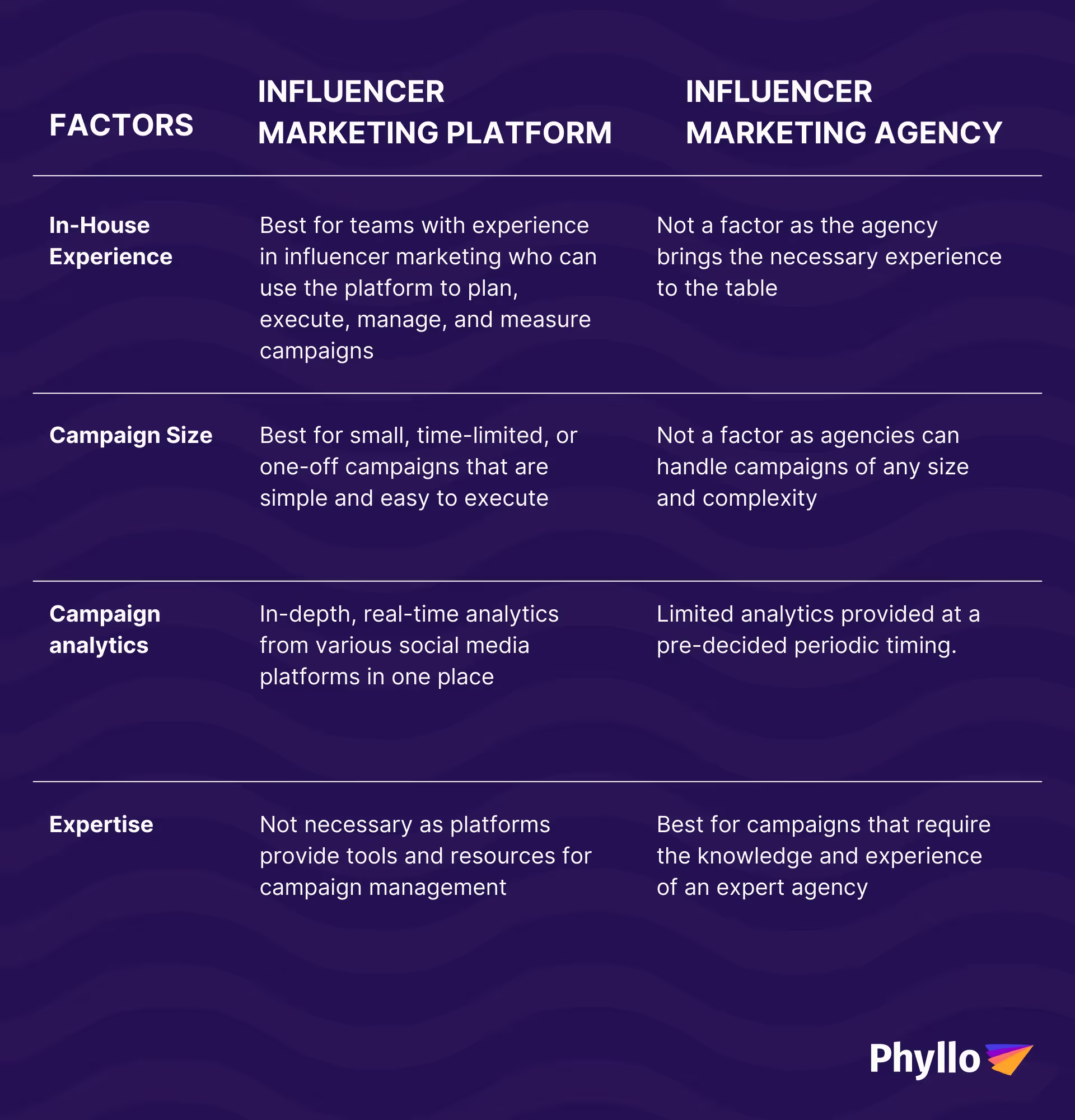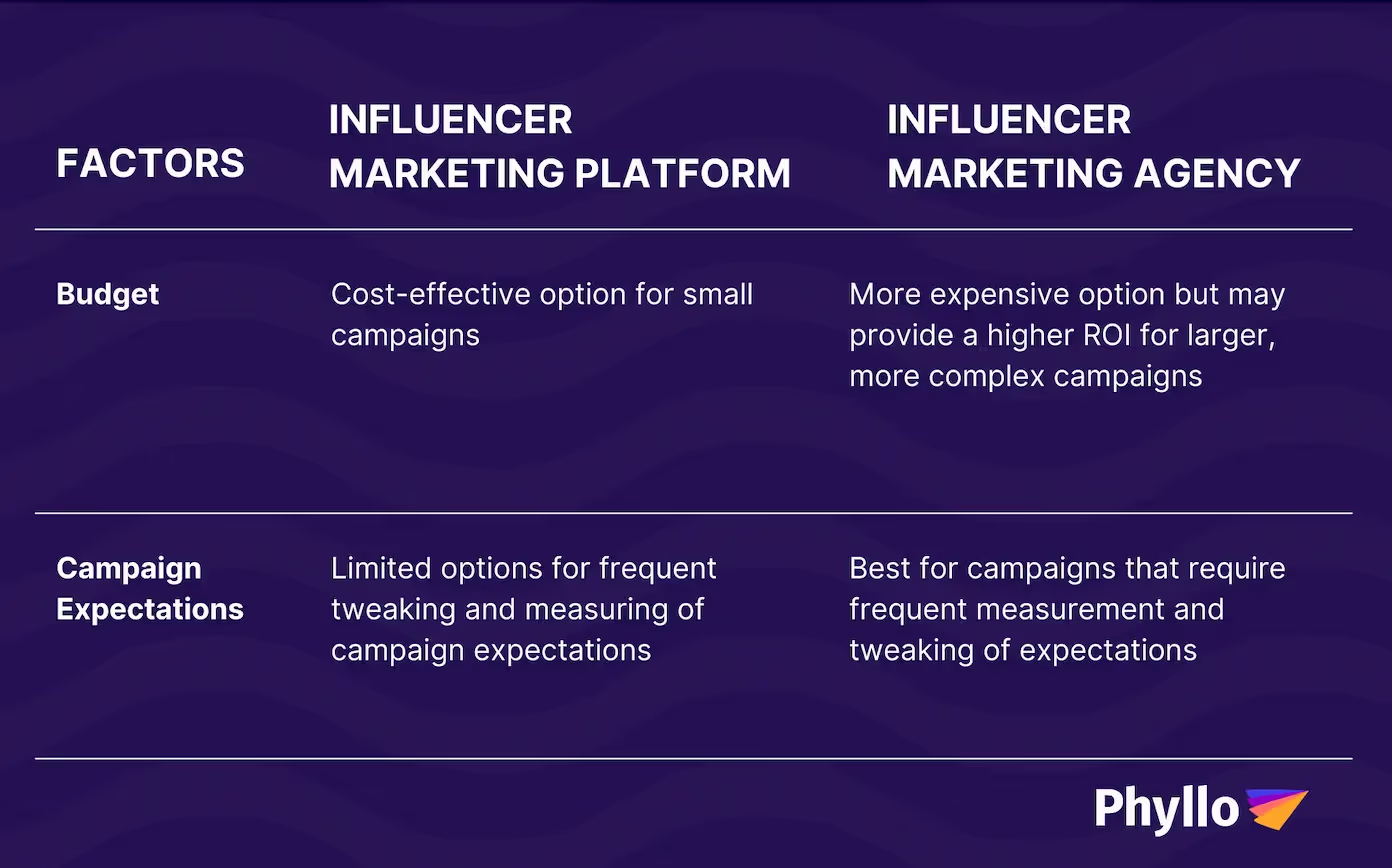According to the Edelman Trust Barometer, only 52% of U.S consumers trust a business.
At the same time, almost 1 in 2 consumers believe anything an influencer says online. 84% of consumers even say they trust online reviews as much as recommendations from friends.
It is no wonder that brands are spending more and more on influencer marketing. A survey conducted by Linqia found that 86% of marketers have used influencer marketing as a part of their marketing strategy in the past year.
To run their influencer marketing campaigns, brands generally use two routes: Influencer marketing tools/platforms and influencer marketing agencies. Let's understand each of them in detail and figure out the major points of difference.

What is an Influencer Marketing Agency?
Influencer marketing agencies specialize in connecting brands with influencers to create effective marketing campaigns. These agencies typically have a roster of influencers they work with and can help brands identify the most suitable influencers for their marketing goals.
Certain agencies focus on creating influencer campaigns on a limited number of social media platforms, while others are willing to collaborate with influencers across a wide range of social channels. An agency offers end-to-end functionality, from ensuring choosing of the right influencers to execution.
Here are the main functions of Influencer Marketing Agencies:
- Influencer Identification: One of the primary functions of an influencer marketing agency is to help brands discover and choose the right influencers for their campaigns. They may use various tools to identify influencers who align with a brand's values, target audience, and marketing goals.
- Campaign Strategy and Planning: An influencer marketing agency can help brands develop a comprehensive strategy, including identifying campaign objectives, defining target audiences, and selecting the right social media platforms. They can also help brands to plan the campaign timeline, budget, and logistics.
- Contract and Negotiation: Influencer marketing agencies can assist in negotiating contracts between brands and influencers, ensuring that both parties are clear on the terms of the partnership. They can also help brands to navigate legal and regulatory issues related to influencer marketing.
- Content Creation: Some influencer marketing agencies also offer content creation services, including developing social media posts, blog articles, videos, and other promotional content. They may have in-house creative teams or work with external content creators to produce high-quality content that aligns with the brand's messaging.
- Campaign Management and Reporting: Influencer marketing agencies can manage the entire influencer marketing campaign on behalf of the brand, from initial planning to final reporting and analysis. They can track the campaign's performance and provide insights and recommendations for future campaigns.
What is an Influencer Marketing Platform/Tool?
An influencer marketing platform is a digital platform that facilitates collaboration between brands and influencers. These platforms typically offer tools and resources that enable brands to discover, connect, and collaborate with influencers on social media campaigns.
Influencer marketing platforms can help brands streamline the influencer discovery process by providing a database of registered influencers. Brands can search for influencers based on various criteria, such as niche, audience demographics, engagement rates, and past campaign performance.

Here are a few functions of Influencer Marketing Platforms:
Influencer Discovery: Influencer marketing tools often provide a database of influencers. However, brands might have to search for themselves using filters like niche, audience demographics, engagement rates, and past campaign performance. These tools can help brands in creating an influencer database according to matching interests.
Performance Analytics: Influencer marketing tools provide performance analytics to help brands and influencers track the performance of their campaigns. These tools include metrics like reach, engagement rates, and ROI from multiple platforms. This can help brands measure the effectiveness of their campaigns and make data-driven decisions.
Campaign Management tools: Few influencer marketing platforms also include project management tools to help brands and influencers manage the various aspects of their campaign. These tools may include scheduling posts, tracking deadlines, managing budgets, and communicating with team members.
Influencer Marketing Agency vs. Influencer Marketing Platform: Which one should you use?
While working with agencies and platforms - both have their advantages and disadvantages, the choice ultimately depends on your specific needs and goals.
An influencer marketing agency typically offers a full-service approach to influencer marketing. This option can be great for businesses with limited internal resources or experience with influencer marketing.
On the other hand, an influencer marketing platform provides businesses with a self-service approach to influencer marketing. These platforms also provide tools for managing campaigns and measuring results. This is a better choice if you have an in-house team for influencer marketing or are working on a limited budget.
Here are few other factors to consider when choosing between a platform or an agency for your influencer marketing campaigns:


Why are some agencies shifting to Influencer Marketing tools?
Several agencies have recently expanded their offering to influencer marketing tools/platforms. Some are using these tools for internal processes, while others are expanding or changing their business models to that of influencer marketing platforms.
The reasons are logical. While agencies have a network of influencers, they struggle to provide meaningful insights to their clients. Having an internal or external analytics dashboard will help agencies bridge this gap.
Moreover, selling their services as platforms will help agencies add smaller organizations as clients and scale up their business. This also allows them to sell their software solutions as white-glove services to more prominent clients.

Phyllo is helping influencer marketing agencies build a robust application to onboard verified creators, track content performance, and measure campaign ROI seamlessly.
Our complete product suite is tailor-made for connecting with the right influencers and getting the most out of brand campaigns. Some of our features include:
- Finding & onboarding verified influencers
- Understanding fan demographics
- Analyzing profile & reputation data
- Monitoring multiple content types
- Tracking their content performance
- Measuring campaign performance & ROI
To know more about how Phyllo is helping influencer marketing agencies, contact us.

.avif)







